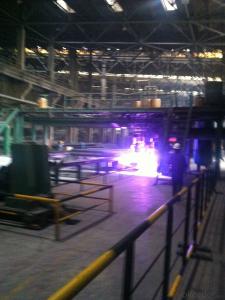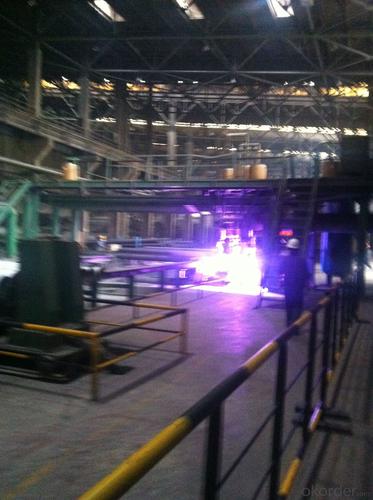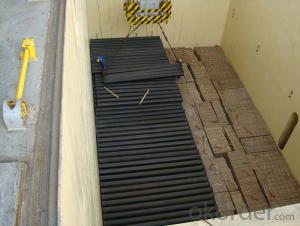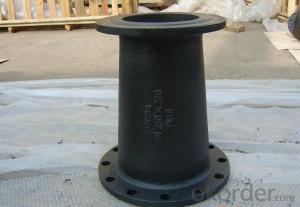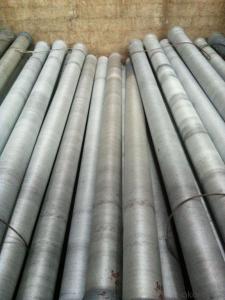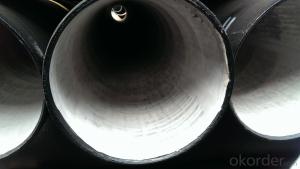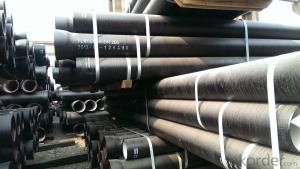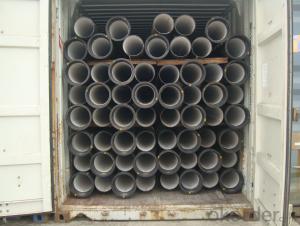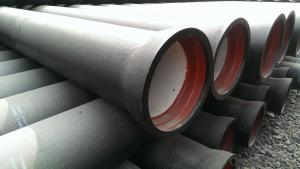DUCTILE IRON PIPES AND PIPE FITTINGS K7 DN900
- Loading Port:
- Tianjin
- Payment Terms:
- TT OR LC
- Min Order Qty:
- 25 pc
- Supply Capability:
- 30000 pc/month
OKorder Service Pledge
OKorder Financial Service
You Might Also Like
Material : Ductile Cast Iron
Size Range : DN 80mm to DN 2000mm
Unit Effective Length : 6m or 5.7m
Manufacture Standard: ISO 2531:1998/ EN 545:2006/EN 598:2007
Annual capacity : 200,000 tons
Coating Exterior: Zinc 130g/m2 according to ISO 8179-1 and bitumen coating 70 microns.
Cement Interior: Portland Cement/ High Alumina Cement/ Sulphate Resisting Cement Lining according to ISO 4179
Special requirements on external coating and internal lining can be applied
We also provide accessories such as SBR/EPDM rubber gaskets, lubricant paste, pipe caps, PE sleeves, etc.
Additional Parts:
Each pipe is strictly inspected according to related standard to ensure permanently high performance.
Easy Installation at site and service free for life
Long Service Lifespan
Quotation will arrive you within 24hours once we get your inquiry.
We guarantee offering you a competitive price.
A copy of original inspection reports of pipes will be offered after shipment.
Photos of loading process will be sent to the customer after shipment effect.
We will follow-up the delivery progress after shipment effect and update to the customer on weekly basis.
- Q: Can ductile iron pipes be used for both water and wastewater applications?
- Ductile iron pipes are versatile and can be utilized in both water and wastewater settings. Their durability, strength, and corrosion resistance make them appropriate for various purposes such as water distribution, sewage systems, and wastewater treatment plants. These pipes are specifically engineered to endure high pressure and effectively manage the flow of both water and wastewater. Furthermore, ductile iron pipes possess a lengthy lifespan, minimizing the necessity for frequent replacements and maintenance. This attribute renders them a cost-effective alternative for both water and wastewater applications.
- Q: Are ductile iron pipes suitable for tunneling projects?
- Yes, ductile iron pipes are suitable for tunneling projects. They have high strength and flexibility, making them able to withstand the ground movement and settling that can occur during tunnel construction. Additionally, their corrosion resistance and longevity make them a reliable choice for underground applications.
- Q: Are ductile iron pipes suitable for use in chemical processing plants?
- Yes, ductile iron pipes are suitable for use in chemical processing plants. Ductile iron is a type of cast iron that has enhanced mechanical properties, making it highly resistant to corrosion and suitable for handling various chemicals in industrial settings. It is known for its high tensile strength, durability, and flexibility, allowing it to withstand the high-pressure and temperature conditions often present in chemical processing plants. Additionally, ductile iron pipes have a smooth internal surface, which helps to minimize friction and reduce the risk of flow blockages or contamination. Overall, ductile iron pipes offer a reliable and cost-effective solution for transporting chemicals in chemical processing plants.
- Q: Can ductile iron pipes be used for cooling water systems?
- Yes, ductile iron pipes can be used for cooling water systems. Ductile iron pipes are known for their durability, strength, and corrosion resistance, making them suitable for a wide range of applications, including cooling water systems. These pipes have the capacity to handle high pressure and temperature fluctuations, making them ideal for circulating and transporting cooling water. Additionally, ductile iron pipes have a smooth internal surface that reduces friction and minimizes the risk of scaling or clogging, ensuring efficient flow of the cooling water. Therefore, ductile iron pipes can be a reliable and efficient choice for cooling water systems.
- Q: How much is the installation fee of the 400 largest ductile iron pipe?
- From the hydraulic performance, because ductile pipe specifications generally refers to the inner diameter of PE pipe diameter specifications generally refers to the same specifications, because under the condition of ductile pipe can achieve greater runoff; from the installation and maintenance cost, ductile pipe have more favorable price. The inner wall of zinc spray, anti-corrosion materials such as cement mortar.
- Q: Can ductile iron pipes be used for underground water treatment systems?
- Yes, ductile iron pipes can be used for underground water treatment systems. Ductile iron is known for its strength and durability, making it a suitable choice for underground applications. Additionally, ductile iron pipes have excellent corrosion resistance, which is important for water treatment systems that may come into contact with various chemicals and contaminants.
- Q: Can ductile iron pipes be used for river crossings?
- Yes, ductile iron pipes can be used for river crossings. Ductile iron is a strong and durable material that is capable of withstanding the pressure and stress of being buried and crossed by a river. It is commonly used for various applications, including water and sewage systems, and has been proven to be reliable for river crossings. However, it is important to consider other factors such as the depth of the river, the size and weight of the pipes, and the installation process to ensure the proper design and installation of the ductile iron pipes for river crossings.
- Q: Ductile iron 600-3 grade, tensile strength, how to test, there is a simple way?
- Generally use tensile machine to do, I often operate, or you see the metallographic 3J above perlite 60% above should be no problem
- Q: Classification of cast iron pipes
- Water cast iron pipe:The use of cast iron cast iron water pipe of No. 18 above by adding nodulizer, after centrifugal ductile cast iron pipe by centrifugal casting machine, the performance of ductile iron pipe with nature, iron and steel, excellent corrosion resistance, good ductility, good sealing effect, simple installation, mainly for municipal, industrial and mining enterprises water, gas, oil etc.. Water supply pipe is the first choice, with high cost performance.
- Q: What is a graphite cast iron pipe?
- Ordinary cast iron consists of gray cast iron and ductile iron, the difference is the carbon in cast iron (graphite) exist, graphite in gray cast iron is in the shape of flake, so the strength and toughness are poor; graphite in shape is spherical, with little on dissevered the matrix. So strong and toughness will be much better.
Send your message to us
DUCTILE IRON PIPES AND PIPE FITTINGS K7 DN900
- Loading Port:
- Tianjin
- Payment Terms:
- TT OR LC
- Min Order Qty:
- 25 pc
- Supply Capability:
- 30000 pc/month
OKorder Service Pledge
OKorder Financial Service
Similar products
Hot products
Hot Searches
Related keywords
